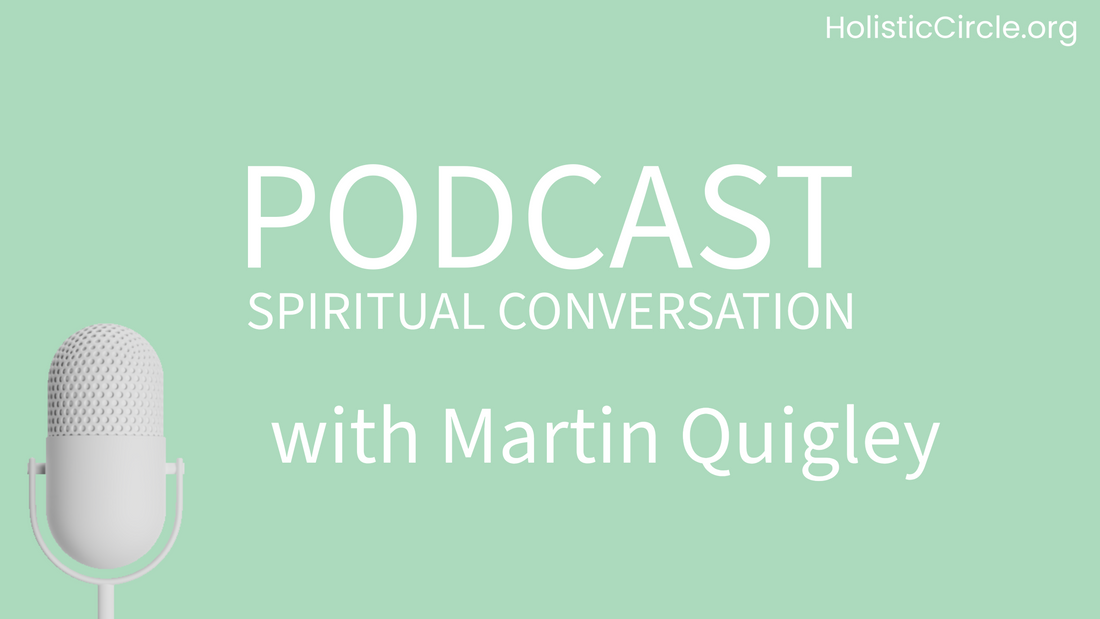
Spiritual Conversations: When Numbers Mean More Than Maths! today with guest Martin Quigley
Share
If the Enneagram had a cheerleader, Martin Quigley might just be it — and no pom-poms required. On this week’s Spiritual Conversations, a podcast that seems to be carving out its own niche as the thinking person’s spiritual guide, host Philipp Kobald welcomes Martin, a coach and author, to talk about the ancient yet bizarrely modern practice of the Enneagram.
Now, before you roll your eyes and dismiss this as yet another personality-typing fad — you know, the sort that reduces your complex humanity into a bite-sized category — hold fire. Because this episode is a deep dive into what these nine “types” actually mean, why they matter, and how understanding them could lead to something genuinely transformative. Yes, we’re talking spiritual enlightenment. No, you don’t have to start chanting or spend a month in a yurt.
Numbers, but Make Them Philosophical
Kobald opens by admitting that despite decades of dabbling in spirituality, Quigley has managed to baffle him. “I’ve been in this field for 30 years,” Kobald says, “and yet I’ve never heard of anything quite like this.” It’s not every day you find a host so willing to concede ignorance, and the resulting exchange is refreshingly devoid of spiritual posturing.
Quigley takes listeners through the basics: Enneagram, derived from the Greek for “nine points,” is a system that categorizes human behavior into nine archetypes. Each number represents a distinct pattern of thinking, feeling, and acting. Sounds simple? Not so fast. “I prefer people to discover their type through workshops,” Quigley explains, shunning the quick-fix allure of online quizzes. It’s not about being handed a number on a silver platter; it’s about embarking on a journey to truly find yourself.
More Than Just Navel-Gazing
The podcast hits its stride as Quigley recounts his own initiation into the Enneagram, involving a particularly forthright spouse who handed him a paper and said, “Read this — it’s you.” Cue existential crisis. But it worked. Quigley describes the “bolt upright” moment when he realized someone had nailed his essence in a few paragraphs.
What follows is an engaging exploration of why understanding your Enneagram type isn’t about boxing yourself in but rather about breaking free. The nine types aren’t merely descriptive; they’re transformative tools for self-awareness. Whether you’re a one (perfectionist), a nine (peacemaker), or something in between, discovering your type offers a blueprint for personal growth.
The Numbers Are Not the Whole Point
For those who fear being pigeonholed, Quigley is quick to reassure: “I have patterns of type nine,” he says, “but I am not a number.” Instead, he encourages people to see these types as fluid, interconnected systems rather than rigid categories. Even the way he talks about them — “stress points,” “security points,” “resources” — makes it clear that this is no horoscope-style pigeonholing.
The Peacemaker’s Journey
Quigley’s candid discussion of his own type, the “peacemaker,” adds a layer of relatability. “I’m here holding peace for the world,” he quips, “but there’s no space for me.” His journey, which involves finding his voice and asserting his needs, resonates deeply. It’s a reminder that spiritual growth often means addressing the messy bits — learning to say no, embracing discomfort, and letting go of the need to keep everyone happy.
The podcast also delves into broader societal implications. Could the world benefit from more enlightened peacemakers in leadership? Absolutely. But as Quigley and Kobald agree, it’s not just nines who need to step up — it’s humanity as a whole.
Empathy, Please
One of the episode’s most striking takeaways is its advocacy for empathy. Quigley laments the ways in which our hyper-commercialized world exploits personality models for manipulation rather than growth. But he also dares to dream of a society where self-awareness and compassion are woven into the fabric of everyday life — from classrooms to boardrooms.
This isn’t as pie-in-the-sky as it sounds. Quigley envisions practical applications for the Enneagram that could reshape relationships, workplaces, and even global politics. It’s a tantalizing prospect, though he stops short of suggesting the Enneagram can fix everything. After all, even the most enlightened nine can’t magic away quarterly earnings reports.
Finding Your Light
Perhaps the most powerful insight from the episode is Quigley’s assertion that spirituality — whether you call it that or prefer less loaded terms like self-discovery — is about returning to yourself. “We are not our patterns,” he says, urging listeners to step off autopilot and reconnect with their core selves.
It’s a call to action that feels both urgent and deeply personal. And while the podcast doesn’t offer easy answers (you’ll find no quick-start guides or magical mantras here), it does something far more valuable: it invites you to start asking the right questions.
If you’ve ever wondered whether there’s more to life than your default settings, or if you’re simply curious about how ancient wisdom can inform modern self-awareness, this episode of Spiritual Conversations is a must-listen.
Relevant Hashtags
#Podcast #SpiritualConversations #HolisticCircle #PhilippKobald #MartinQuigley #Enneagram #SelfAwareness #SpiritualAwakening #FindYourNumber #Empathy
— — — — — — — — — — — — — — — — — — — — — — — — — — —
Links to our guest:
web: https://mquigley.com/
https://www.buythebook.ie/product/more-than-a-number/ www.instagram.com/mquigleynine https://www.linkedin.com/in/quigleymartin/
— — — — — — — — — — — — — — — — — — — — — — — — — — — —
Links provided by our host: HolisticCircle
web: HolisticCircle.org
youtube.com/@HolisticCircle
Instagram @holistic_circle_org
we offer: online one-on-one sessions (spirituality, personal development)
— — — — — — — — — — — — — — — — — — — — — — — — — — — —
For more information, visit HolisticCircle.org. Copyright HolisticCircle.org by Philipp Kobald, 2024.